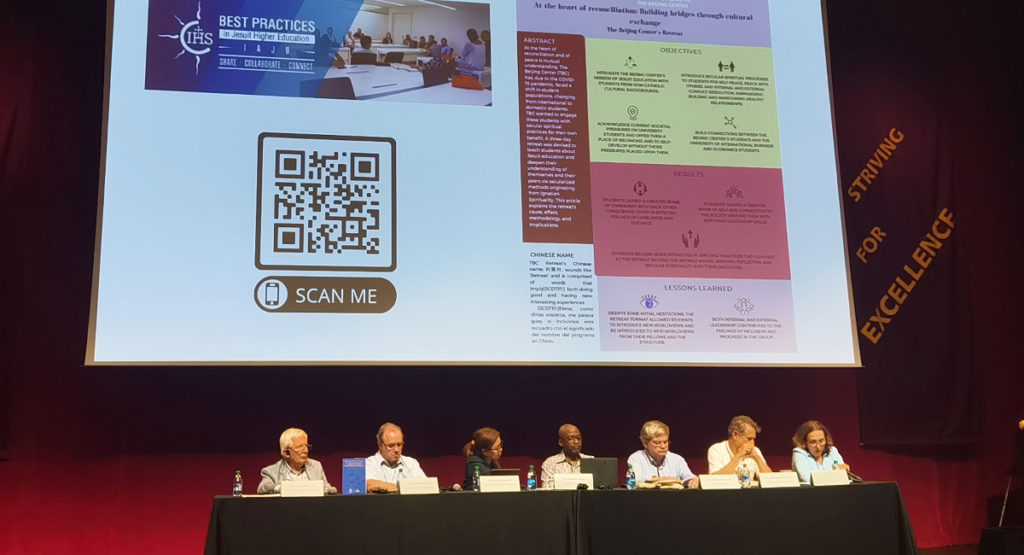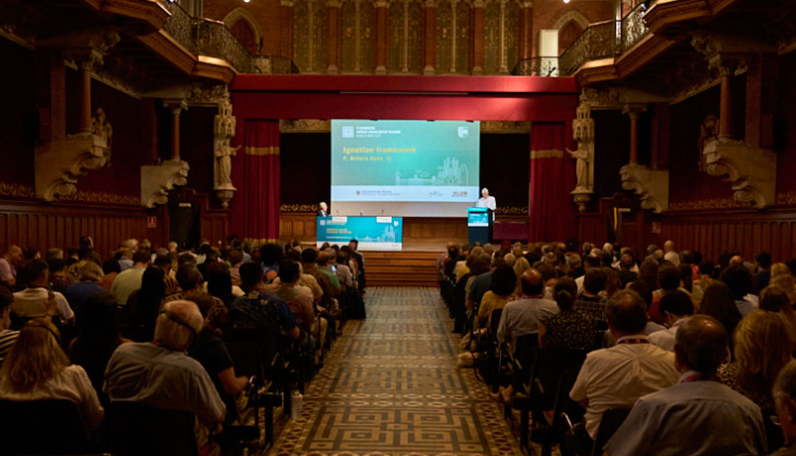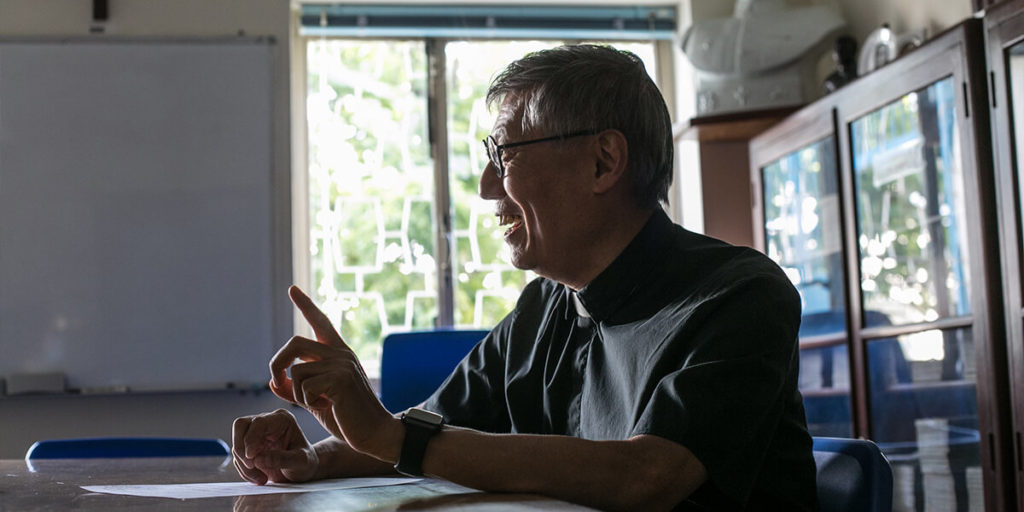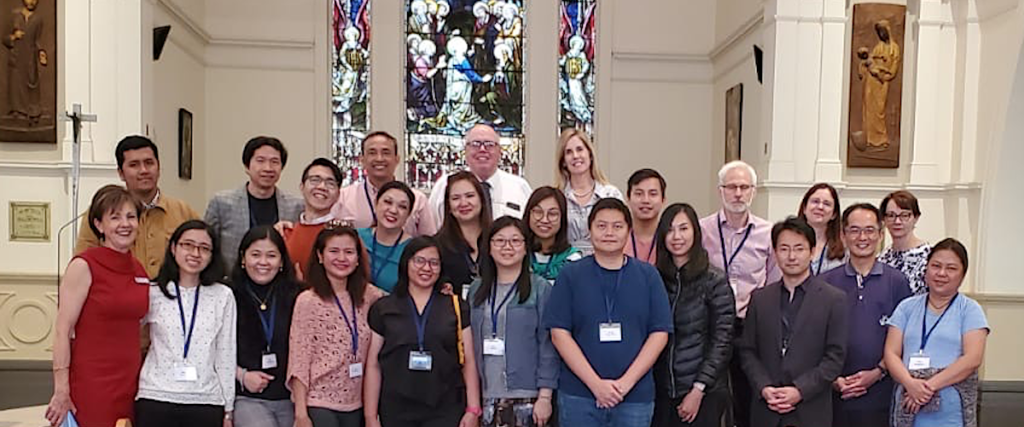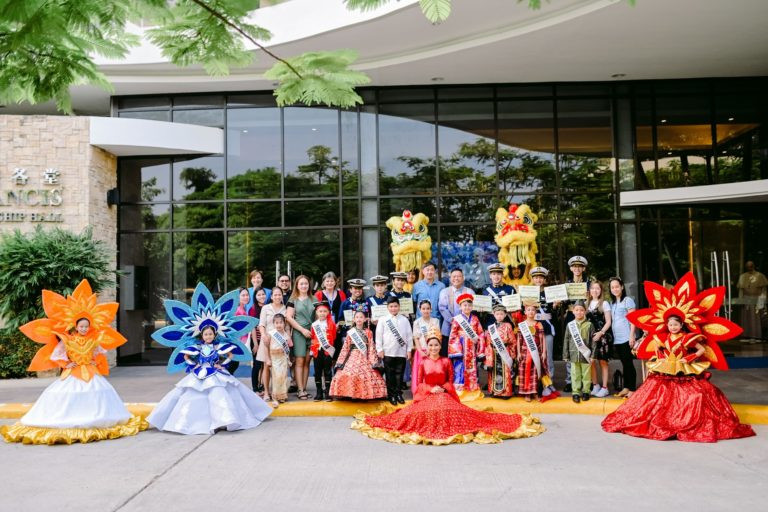A paper by The Beijing Center (TBC) has been published in the “IAJU Best Practices in Jesuit Higher Education Project,” an initiative coordinated by the Kircher Network and composed of contributions from the International Association of Jesuit Universities (IAJU) regional networks. Continue reading “TBC featured in IAJU’s Best Practices in Jesuit education”
TBC featured in IAJU’s Best Practices in Jesuit education
A culture of collaboration to become persons with and for others
On Thursday, 14 July, Fr. General Arturo Sosa SJ spoke during the X Congress of the World Union of Jesuit Alumni (WUJA) at the San Ignacio Sarria College in Barcelona.
During his talk, Fr. Sosa made an invitation to continue the conversation initiated by Fr. General Arrupe almost 50 years ago with the Jesuit alumni, where he invited them to become persons for and with others. This invitation is still valid today in our current context and Fr. Sosa wants to expand it, so that Jesuit alumni become true partners in the mission of reconciliation and justice that the Church has entrusted to the Society of Jesus.
Fr. Sosa is aware that this invitation will require that both alumni and the Society of Jesus foster a culture of collaboration for a shared mission, based on the gifts that God has given to each one of us and under the guide of the Universal Apostolic Preferences. Although it is true that collaboration in the mission has deepened in recent years with the contributions of many lay persons who carry out the works of the Society of Jesus, this invitation from Fr. General is a new and challenging step in the relationship between the Society of Jesus and its alumni.
A Wahyanite becomes the school supervisor – to be a bridge for students
A mile from shore a fishing boat chummed the water, and the word for Breakfast Flock flashed through the air, till a crowd of a thousand seagulls came to dodge and fight for bits of food. But way off alone, a seagull was making hundreds of glides – making a curve, stretching his wings, twisting, stalling. Continue reading “A Wahyanite becomes the school supervisor – to be a bridge for students”
Ignatian Teachers’ Program in Sydney
The Ignatian Teachers’ Program (ITP) was held on November 11 to 15 at St Ignatius’ College, Riverview in Sydney, Australia. Located near Lane Cove River, St Ignatius’ College has beautiful Jacaranda trees on the campus. Walking along the main building and the rose garden allowed each participant to savour the long tradition of this Jesuit school.
There were 18 participants from the Philippines, Indonesia, Japan, Macau and Hong Kong. Most of them were experienced teachers, with a few school directors, administrators and school chaplains.
The workshop began every morning with a meaningful prayer session guided by John Gills, the school’s Director of Religious Formation. The specially designed prayers helped the participants each day to open themselves to the movements of the Holy Spirit. After all, the discernment of the Holy Spirit’s promptings is at the very core of Ignatian Spirituality, which is the basis of Jesuit Education.
On the first day, the participants were asked to reflect on the history and tradition of the Ignatian approach to teaching – or what we call Ignatian Pedagogical Paradigm (IPP). The IPP pays special attention to the context of the students. Participants reflected on how the IPP enables them to accompany their students, to know their needs and to promote learning more effectively.
The most striking experience for many of the participants was the “Through the Eyes of the Student” Program. The participants shadowed a student assigned to them, learning through observation what the students experienced. It was a challenge for many because they should focus on the students without criticising them. They were not supposed to tell the students what to do. Rather, they were asked to listen and to try to find how the students felt. At the end of the day, we were all grateful for this one-day one-of-a-kind experience. We became more aware of our students’ needs and we gained new insights about learning and teaching through this unique experience.
There was also a session where participants shared their experiences and practice of the IPP in their respective schools. Aside from learning about the diverse ways IPP is implemented, the participants learned from each other. For example, students can practise the Examen in various ways depending on the school’s context. We felt encouraged that each Jesuit school was concerned about their students’ holistic growth including participation in social services for the poor in their societies.
For example, students from Sacred Heart School-Ateneo de Cebu High School are required to work in Jollibee fast food as part of their service, offering their wages to support poor families. Students from Kolese Kanisius volunteer to clean up rubbish on the public streets of Jakarta.
The participants realised not only the diversity of their situations, but also their unity as a worldwide community dedicated to a common mission. It was important to build the network of each school.
After the sharing, the educators visited the teachers of the school’s special education unit – providing yet another opportunity to learn a different way of accompanying our students.
On our last day, Jennie Hickey, Executive Director of Jesuit Education Australia, introduced the education apostolic work of the Jesuit Conference of Asia Pacific. She insisted that Jesuit education was a mission for the service of the poor as St Ignatius of Loyola and the First Companions had intended. The Society of Jesus has always worked for faith and justice.
There are many challenges in carrying out this mission as fewer Jesuits work in schools today. It is important for Ignatian educators to realise that they are called to dedicate themselves to the mission. Though our contexts are different, we still share the common mission.
We ended the five-day workshop with a Eucharistic Celebration in the school chapel. We thanked the Lord for the abundant graces that we received. Besides the formal sessions, we appreciated the informal conversations and sharing among ourselves during the breaks and over the meals. [JCAP Education]
Fr Clement Tsui SJ is the Education Delegate of the Chinese Province.
Ignatian educators “go back” to high school
On the morning of September 19, the junior and senior high schools of Sacred Heart School-Ateneo de Cebu in the Philippines opened their doors to welcome 50 Ignatian educators from Asia Pacific into their classrooms. They were participants in the second Jesuit Conference of Asia Pacific (JCAP) workshop on the Principle and Foundation of Jesuit Education. They came from Timor-Leste, Hong Kong, Indonesia, Macau, Taiwan, Pakistan and the Philippines.
The activity, called Student Accompaniment Program, is a concrete response to the Universal Society’s call to “accompany the youth in the creation of a hope-filled future”. Moreover, true to the spirit of Ignatian Pedagogy, it was also an exercise in empathy with the participants immersing themselves in the students’ context. All through that morning they were led by the high school students assigned to guide them through a typical day in their high school life.
The Student Accompaniment Program was, for many participants, the highlight of the workshop. It was a rare opportunity for these educators to actually sit through the classes we offer our students.

“I became a student again,” shared Ling Yun So from Hong Kong. “I experienced that long lost feeling of being a student.”
“It’s already been 30 years [since high school] and I became very curious and actually a little bit scared and worried because I found out this morning that there were quizzes and I didn’t know if I was ready to take them!” said Maricar Kristin Panganiban from the Philippines.
The participants were grateful for the meaningful insights they obtained as a result of the activity. Some even considered the experience an eye-opener as an educator even if their contexts may differ from Sacred Heart School-Ateneo de Cebu in some way.
Nevertheless, thanks to our gracious hosts led by the School President, Fr Manny Uy SJ, the workshop treated the participants with a number of other highlights. For one, the opening ceremony was like no other we have ever had in our previous JCAP workshops. We were welcomed with both a joyfully boisterous lion dance and a beautifully moving Sinulog prayer–a wonderful mix of Chinese and Filipino cultures to symbolise the unique mission of our host school.
As in all of our workshops, the participants did a lot of work, not only listening to the inputs of the facilitators, but sharing their personal experiences and insights with their colleagues from other countries.
The workshop was designed to give the participating educators an opportunity to reflect on the history and tradition of Jesuit education, its characteristics, and most particularly, its goal as captured by the so-called 4 Cs (Competence, Conscience, Compassion and Commitment).
But just as important as the formal sessions were the informal conversations among the participants during the breaks and over the meals. Thanks to the schools’ benefactors, we had some pretty special meals as well, starting with the welcome dinner, when we celebrated the birthday of the new Education Delegate for the Chinese Province, Fr Clement Tsui SJ.
As always, each day of the workshop was capped with a Eucharistic Celebration to thank the Lord for the abundance of graces received. Each day we made sure to pray especially for the school community that hosted our workshop and the generous benefactors who made the experience extra special.
What made this workshop very special, however, is that upon the approval of the Chinese Provincial, Fr Stephen Chow SJ, we welcomed a new affiliate school to our network, the Marymount Primary and Secondary Schools in Hong Kong. Also, for the first time, our colleagues from Pakistan requested to join our workshop and their request was graciously granted by JCAP President, Fr Tony Moreno SJ.
At the close of the workshop, the participants were requested to share whatever they learned with their colleagues as they returned to their respective schools. They were also strongly encouraged to keep in touch with one another and to feel free to consult with–and offer assistance to–their colleagues in Asia Pacific. After all, they were able to create many unforgettable memories these last few days and were certainly able to establish new friendships among themselves–and with the students. [JCAP Education]
 Fr Johnny C Go SJ is the Secretary for Pre-Secondary and Secondary Education of the Jesuit Conference of Asia Pacific. He is also the Assistant for Mission and Identity of the International Commission on the Apostolate of Jesuit Education, an advisory council to the Secretariat for Education in the Jesuit curia in Rome to ensure quality service in the field of education.
Fr Johnny C Go SJ is the Secretary for Pre-Secondary and Secondary Education of the Jesuit Conference of Asia Pacific. He is also the Assistant for Mission and Identity of the International Commission on the Apostolate of Jesuit Education, an advisory council to the Secretariat for Education in the Jesuit curia in Rome to ensure quality service in the field of education.
Watch this video to know what the Ignatian educators have to say about their experience in the Student Accompaniment Program. This video was created by No Budget Productions composed of high school students of Sacred Heart School-Ateneo de Cebu.
The gift of education in Cambodia
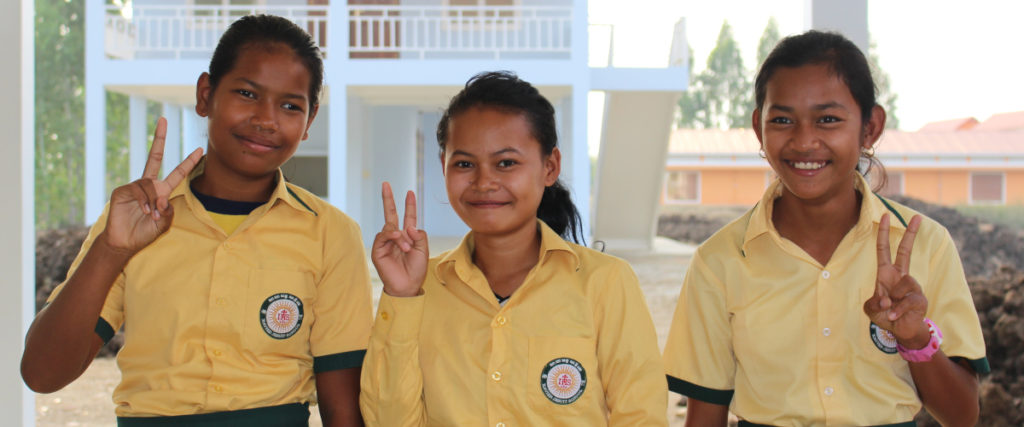 It has been 20 years since the surrender of the Khmer Rouge, but Cambodia remains deeply scarred by decades of war and conflict. One of the poorest countries in the world, it has vastly inadequate healthcare and education infrastructure. Just one in four young people finish high school and even fewer in rural communities. Sometmes children as young as 10 years old engage in unsafe and heavy work, labouring on construction sites or farms. Even if children stay in school, the standard of education in government schools is extremely low. Students at 11 or 12 years old often still can’t read or write.
It has been 20 years since the surrender of the Khmer Rouge, but Cambodia remains deeply scarred by decades of war and conflict. One of the poorest countries in the world, it has vastly inadequate healthcare and education infrastructure. Just one in four young people finish high school and even fewer in rural communities. Sometmes children as young as 10 years old engage in unsafe and heavy work, labouring on construction sites or farms. Even if children stay in school, the standard of education in government schools is extremely low. Students at 11 or 12 years old often still can’t read or write.
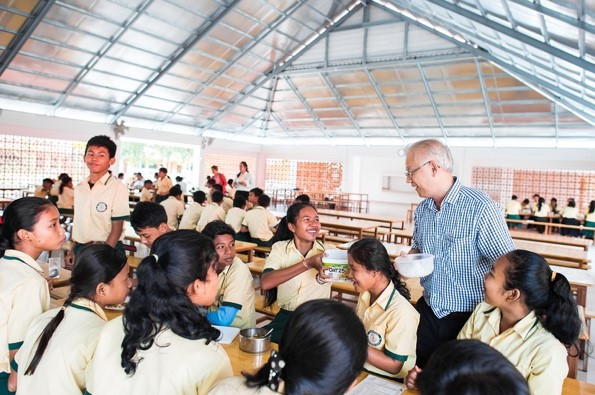
Sophea is one of many Cambodian children struggling to get an education. She lives in a rural area with her mother Mony, a single parent, who had little education herself and works as a day labourer, often travelling great distances to find employment. To educate her four children would cost $4 a day, or 80 per cent of her income. She faces a choice no one should have to make: Should I feed my children or educate them? Mony’s children, like so many others, know they must help out from an early age. The eldest child usually stops schooling to help supplement the family income. Sophea had started government primary school but could not attend regularly. She and her older brother had to find work to help Mony care for their two younger siblings.
One day Jesuit Service Cambodia (JSC) found Sophea in a bottle factory working with her mother. JSC’s outreach team travels around to poor villages in search of families that need help. They identified Sophea as a scholarship candidate for Xavier Jesuit School.
In 2015, the Jesuits opened Xavier Jesuit School (XJS) in Banteay Meanchey, one of the poorest provinces in Cambodia.
“Our goal is to convince students that you sacrifice a few years now, but then you can help not only yourself, but your family,” says Fr Quyen Vu SJ, the school’s director. “Through education these students can go on to have skills, a career, a profession.”
The school encourages independent thought instead of the usual rote-learning taught in Cambodian schools. It strives to empower students, strengthening their hearts and minds so they can learn, grow and contribute to the new future of Cambodian society.
In addition to traditional subjects like mathematics, English, chemistry, physics, biology, history, geography and agriculture, students also learn Khmer, music and art.

Currently 530 students attend XJS from kindergarten to Year 12. Within three years, Fr Quyen hopes to increase that to 1,210 students. XJS is committed to serving the poorest of the poor with at least 20 per cent of the student cohort to receive free education through scholarships, such as those provided by Jesuit Mission Australia.
Scholarships ease the burden for very poor families. In the short-term, families have the benefit of one less mouth to feed, while in the long-term young people help lift their families out of poverty as they use their education to become teachers and future leaders.
Sophea had a tough first year at school. She was 16 but still in Year 7, which meant she had to study with peers three or four years younger than she was and often academically more advanced. She also struggled with her guilt about leaving her mother and younger siblings.
But Mony’s vision for her daughter is strong. She encouraged Sophea to be brave and to dream of a worthwhile future. After a year, Sophea began to take younger children under her wing, and soothe their worries with her jokes and games. Today the change in her is dramatic.
“She is so full of joy!” reports Fr Quyen. “Her hard work and determination are paying off.”
Two years ago Sophea was working as an unskilled labourer. Now, she’s thriving.
To learn more about Xavier Jesuit School and the support provided by Jesuit Mission Australia, visit https://jesuitmission.org.au/program/xjs/
Educating for depth and reconciliation
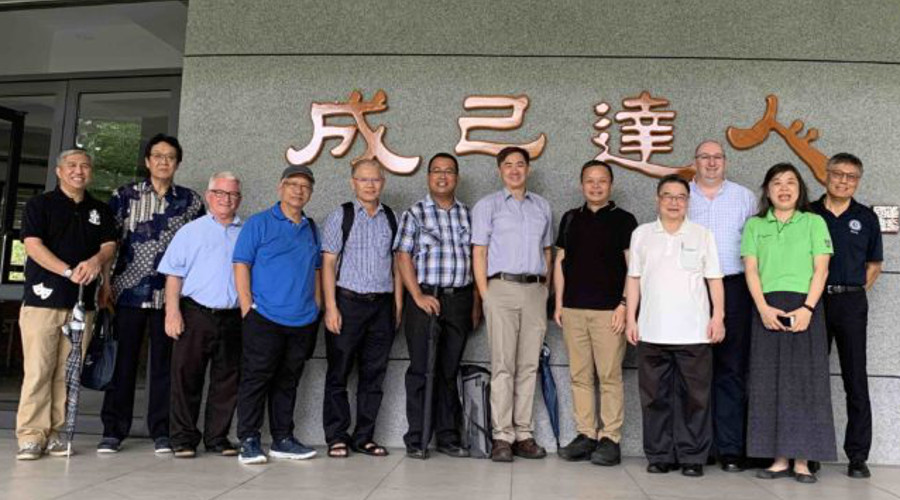
Education Secretaries of the Jesuit Conference of Asia Pacific (JCAP) were in Taipei from May 14 to 18 to discuss the II COLLOQUIUM JESEDU JOGJA 2020, and to identify concrete ways in which the Universal Apostolic Preferences (UAPs) of the Society of Jesus can be promoted by our schools.
II COLLOQUIUM JESEDU JOGJA 2020 is the second global gathering of Jesuit secondary schools. The first international colloquium was held in Boston College in 2012. About 500 school leaders will gather in Sanata Dharma University, Yogyakarta, Indonesia from June 29 to July 4, 2020 to learn more about “Educating for depth and reconciliation”.
The education secretaries held spiritual conversations on the UAPs. To concretise the conversations, they identified what they considered “crucial threats” and “promising opportunities” in their work of education.
“The discussions were rich and full of fresh insights that should guide our schools in concretising these apostolic preferences this decade”, said JCAP Education Secretary Fr Johnny Go SJ. “The conversations about the UAPs are expected to continue among our schools”, he added.
Apart from the annual reports from the Provinces and the Regions, the group also took the opportunity to visit St Ignatius High School (徐匯中學), where each learned about the school’s flagship formation programme called Life Education.
Learning to become schools of discernment
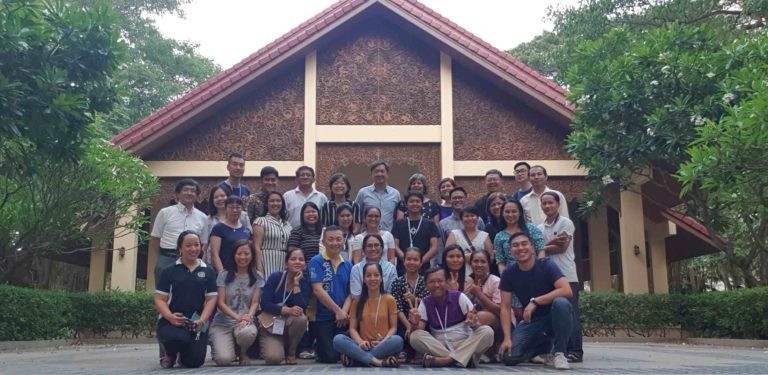
From April 26 to May 1, a diverse group of educators from Jesuit schools in Cambodia, Hong Kong, Japan, Macau and the Philippines met at the Seven Fountains Retreat Center in Chiang Mai, Thailand for a workshop on “Apostolic Planning and Decision Making through Communal Discernment”. The title is a mouthful; after all, discernment in common is a complex and difficult, albeit worthwhile process.
The participants had a first-hand experience of discernment in common, one of the identified Universal Apostolic Preferences of the Society of Jesus. There was emphasis on listening to others as well as listening to one’s interior movements. The spiritual conversations were conducted in mixed groups to allow the participants to learn from one another’s contexts and cultures. There were moments of personal prayer and reflection in preparation for the spiritual conversations.
“It was important for the participants to listen attentively not only to members of their own groups, but also to the plenary reports from the small groups. It is counter to what educators are accustomed to, given their workload and busy lives”, said Fr Johnny Go SJ, Education Secretary for the Jesuit Conference of Asia Pacific (JCAP).
Fr Go facilitated the workshop together with Jennie Hickey, Executive Officer of Jesuit Education Australia, Fr Roy Ragas SJ of Emmaus Center for Psycho-spiritual Formation and Jeraldine Ching from Xavier School in the Philippines.
The JCAP Ignatian leadership workshops have become known for their socials. Delegates from Ateneo de Cebu / Sacred Heart Jesuit School in the Philippines organised an evening of games to break the ice and build a sense of community. Consequently, one of the best parts of the workshop was the friendships formed. “These personal relationships are the crucial ingredient to the networking that we hope to strengthen among our schools in Asia Pacific”, said Fr Go.
The participants were most grateful for the actual experience of spiritual conversations. “We ended the workshop with the optimistic resolve to find ways of incorporating some of the elements of communal discernment in selected decision-making processes in our schools”, said Fr Go. “As Jennie put it at the end of the workshop, we hope that our schools will truly become schools of discernment.”
Voices from Leadership by Conversation workshop
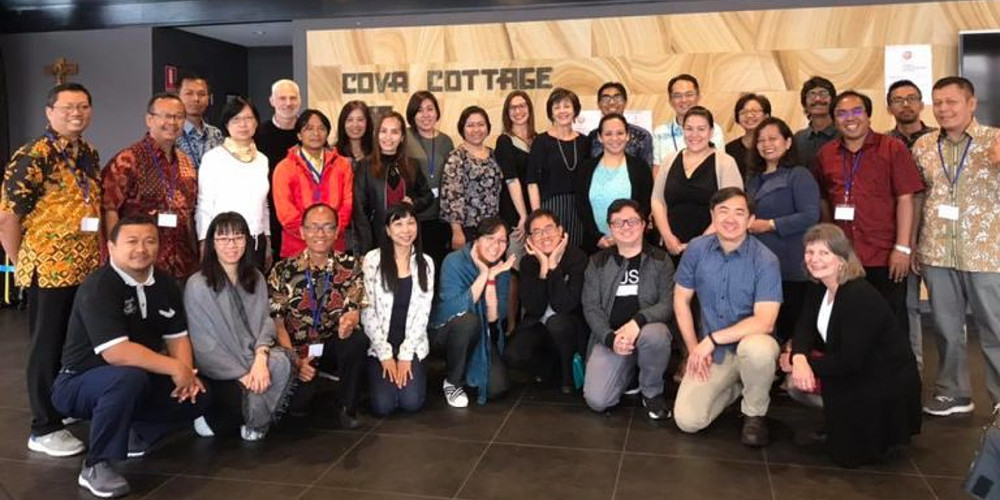
What better way to practice cura personalis than to use an approach to Growth Coaching that is based on ‘listening to the self, to others, to creation and to God?
This was the premise of the second workshop on Ignatian Pedagogical Paradigm organised by the Jesuit Conference of Asia Pacific Education Secretariat. The workshop combined Ignatian conversation with Growth Coaching and best practices on feedback giving.
The idea first emerged in Kamakura, Japan, where a team from St Ignatius’ College, Riverview, Australia conducted the Ignatian Teachers Program.
“The group agreed that a module on coaching and mentoring based on the Ignatian ministry of holy conversations would respond to an important need among educators in our Asia Pacific schools, and so here we are!” shared JCAP Education Secretary Fr Johnny Go SJ.
Twenty-six educators from the Philippines, Hong Kong, Macau and Indonesia had gathered at St Ignatius’ College, Riverview for the workshop, which was held from November 11 to 17.
Fr Ross Jones SJ, Rector of St Aloysius and former Rector at Riverview, set the tone by talking about St Ignatius of Loyola’s ministry of holy conversation.
Bill Hobbes drew from his vast experience working with the former Jesuit Secondary Education Association in the United States to help the participants grow in self-awareness and understand the dynamics within organisations.
Scholastic Bagus Sugiyono SJ, a first-year regent at Kolese Kanisus in Jakarta, was grateful for the theoretical and practical things he learnt at the workshop. “There are several new insights that I got on how to practice cura personalis for students, as well as teachers,” he said.
Mandy Yu from Estrella do Mar in Macau was “excited and thankful” for the experience to “deepen my spirituality and help me grow”, and is looking forward to applying what she learnt in her school and in her teaching.
The participants were also joined by so-called “Companions” from Riverview who helped to model what coaching based on Ignatian conversation is like. The participants’ first-hand encounter with these expert practitioners proved to be a powerful learning experience.
“I still find it amazing how Ignatian Conversation can be seamlessly linked to Growth Coaching and how feasible it is in our own school setting,” shared Chaveli Ventosa Dela Cerna of Xavier School, Philippines, who found many possibilities for faculty and staff formation in Jesuit institutions.
Irene Cheung, Principal of Colégio Mateus Ricci, appreciated the new approaches she learnt in coaching and listening, as well as the use of tools such as the Myers–Briggs Type Indicator. “The feeding forward bridge,” she added, “is what I most want to master and apply.”
Likewise, Antonius Agus Sulistyono from St Peter Canisius Minor Seminary of Mertoyudan, Indonesia, said that the “feeding forward conversation taught me how to make others better and to lead them to God”.
For many of the participants, the workshop was an opportunity to examine their leadership style.
“I was able to step back and reflect on how I can be a better companion to the teachers and students I work with and how I can lead them to be better partners in the mission,” shared Chuchay Rolan-Lugapo of Xavier School, Philippines.
Vivian Cheng of Wah Yan College, Hong Kong hopes that after the workshop, “each one of us can be a better companion to our students and colleagues”.
For Ag Prih Adiartanto, Principal of De Britto College, Yogyakarta, Indonesia, his most valuable takeaway was, simply, learning how to listen.
Maan Estrellado-Domingo of Xavier School, Philippines shared a similar realisation: “It is not my brilliance, but the love that I put in the conversation that matters”.
The next education workshop will be on communal discernment from April 26 to May 2, 2019 at the Seven Fountains Retreat Centre, Chiang Mai, Thailand.
Student leaders learn to be open to going beyond borders
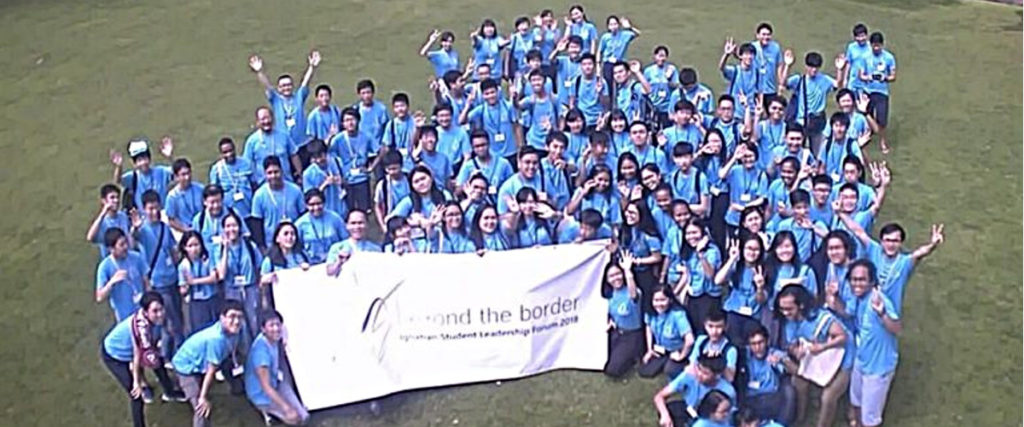 “Our language and culture might be different, but what mattered most is the emotional connection we had. This allowed us to be more open to cross our borders.” Yohana Pegas Syane of Gonzaga College (Jakarta) realised this after participating in the six-day 4th Ignatian Student Leadership Forum (ISLF).
“Our language and culture might be different, but what mattered most is the emotional connection we had. This allowed us to be more open to cross our borders.” Yohana Pegas Syane of Gonzaga College (Jakarta) realised this after participating in the six-day 4th Ignatian Student Leadership Forum (ISLF).
More than 70 student leaders from 19 Jesuit secondary schools in Japan, Taiwan, Macau, Hong Kong, Indonesia, Philippines and Timor-Leste gathered in Tokyo for the forum. It was storming when they arrived on August 8, accompanied by their teachers, but by the time they reached the Sophia University Junior College Hadano campus on the outskirts of Tokyo, a full rainbow blazed in the sky to welcome them.
Fr Sali Augustine SJ, Sophia School Corporation Trustee for General Affairs, welcomed the delegates and presided at the opening Mass. It did not take long for the delegates to bond and make friends, especially with the sports activities the next day.
ISLF began six years ago when five schools in Asia Pacific decided to hold a gathering of student leaders together. They wanted to offer student leaders a chance to get to know their peers in other Jesuit schools and learn from each other about Ignatian leadership in their contexts and experiences. The first ISLF was hosted by Xavier School in Manila.
This year’s theme, “Beyond the Border”, challenged the student leaders to go beyond their own cultures and comfort zones as they discussed world issues such as migration, war and ecology. They also had an opportunity for immersion. Scholastic Naoki Ochi SJ, who conceived the theme, explained that he opted not to use the verb “cross” because “to cross the border is a grace”.
He also hopes that ISLF will help to “promote inter-province events more and more because differences of provinces are not boundaries”. Indeed, this is what many participants realised.
“I grew up in a country where it is so easy to create a lot of borders. But this is not helpful for my country and for the world,” said Ruka Matsumoto of Sophia Fukuoka (Japan). “I’ve realised that I can begin to change this perspective if I change my own perspective first.“
Jules Malhabour of Ateneo de Iloilo (Philippines) said that the most significant lesson he learnt is that people create their own borders. “We are the ones who create our own ‘borders’ and therefore, only we have the ability to erase them. The ISLF experience truly opened both my eyes, and my heart.”
For Danielle Francine Reyes, also from Ateneo de Iloilo, the ISLF was “a bridge among these differences, [that] built strong friendships among countries and brought us fruitful experiences”.
Aprilia de Jesus of Colégio de Santo Inácio de Loiola (Timor-Leste) agrees. “Our differences in cultures and languages do not separate us because we are united as sons and daughters of St Ignatius”.
The forum was also a rewarding experience for the teachers and organising team.
Wah Yan College (Hong Kong) teacher Kei Fung Vic Chan was pleased to see how the students grew as they were given the flexibility to discover what they could do and to explore their personal growth. “In the classroom, teachers at times focus on strategies rather than the person of the students. This is in itself a border that divides. With ISLF I saw how the students learnt more deeply than what is taught in the classroom,” she said.
Muyako Sakura of the Jesuit Education Center office helped to organise the event, and was happy to see the students gradually open up their eyes and hearts to issues of migrants, wars, and ecology.
For Yoshitoshi Kado, a volunteer from Tokyo University, the forum was an “unforgettable memory”. “It was the first time in my life to talk about faith in the Lord with teenagers from other countries and it was very stimulating,” he said.
At the end of the forum, Scholastic Kotaro Mori SJ, who headed the organising committee, likened the ISLF experience to that of the disciples on their way to Emmaus (Luke 24:13-35). They all felt a burning in their hearts, a common flame that will hopefully inspire them to go out into the world beyond their borders.

